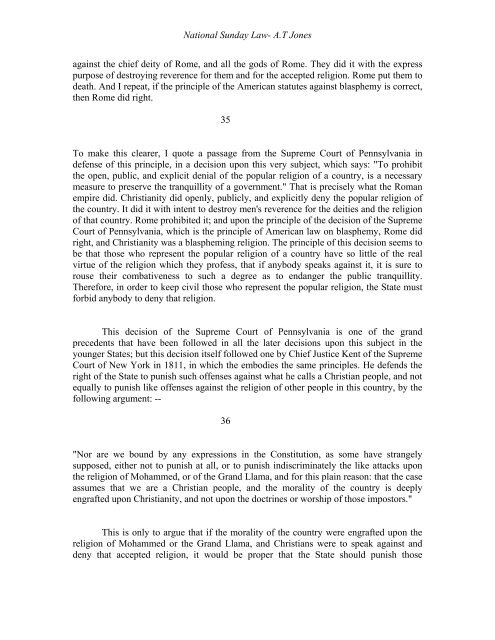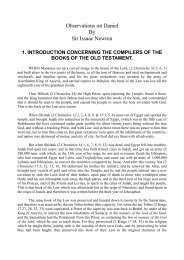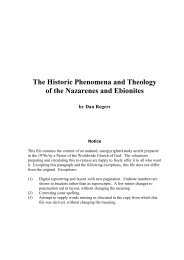THE NATIONAL SUNDAY LAW, ARGUMENT OF ALONZO T ...
THE NATIONAL SUNDAY LAW, ARGUMENT OF ALONZO T ...
THE NATIONAL SUNDAY LAW, ARGUMENT OF ALONZO T ...
Create successful ePaper yourself
Turn your PDF publications into a flip-book with our unique Google optimized e-Paper software.
National Sunday Law- A.T Jones<br />
against the chief deity of Rome, and all the gods of Rome. They did it with the express<br />
purpose of destroying reverence for them and for the accepted religion. Rome put them to<br />
death. And I repeat, if the principle of the American statutes against blasphemy is correct,<br />
then Rome did right.<br />
35<br />
To make this clearer, I quote a passage from the Supreme Court of Pennsylvania in<br />
defense of this principle, in a decision upon this very subject, which says: "To prohibit<br />
the open, public, and explicit denial of the popular religion of a country, is a necessary<br />
measure to preserve the tranquillity of a government." That is precisely what the Roman<br />
empire did. Christianity did openly, publicly, and explicitly deny the popular religion of<br />
the country. It did it with intent to destroy men's reverence for the deities and the religion<br />
of that country. Rome prohibited it; and upon the principle of the decision of the Supreme<br />
Court of Pennsylvania, which is the principle of American law on blasphemy, Rome did<br />
right, and Christianity was a blaspheming religion. The principle of this decision seems to<br />
be that those who represent the popular religion of a country have so little of the real<br />
virtue of the religion which they profess, that if anybody speaks against it, it is sure to<br />
rouse their combativeness to such a degree as to endanger the public tranquillity.<br />
Therefore, in order to keep civil those who represent the popular religion, the State must<br />
forbid anybody to deny that religion.<br />
This decision of the Supreme Court of Pennsylvania is one of the grand<br />
precedents that have been followed in all the later decisions upon this subject in the<br />
younger States; but this decision itself followed one by Chief Justice Kent of the Supreme<br />
Court of New York in 1811, in which the embodies the same principles. He defends the<br />
right of the State to punish such offenses against what he calls a Christian people, and not<br />
equally to punish like offenses against the religion of other people in this country, by the<br />
following argument: --<br />
36<br />
"Nor are we bound by any expressions in the Constitution, as some have strangely<br />
supposed, either not to punish at all, or to punish indiscriminately the like attacks upon<br />
the religion of Mohammed, or of the Grand Llama, and for this plain reason: that the case<br />
assumes that we are a Christian people, and the morality of the country is deeply<br />
engrafted upon Christianity, and not upon the doctrines or worship of those impostors."<br />
This is only to argue that if the morality of the country were engrafted upon the<br />
religion of Mohammed or the Grand Llama, and Christians were to speak against and<br />
deny that accepted religion, it would be proper that the State should punish those
















